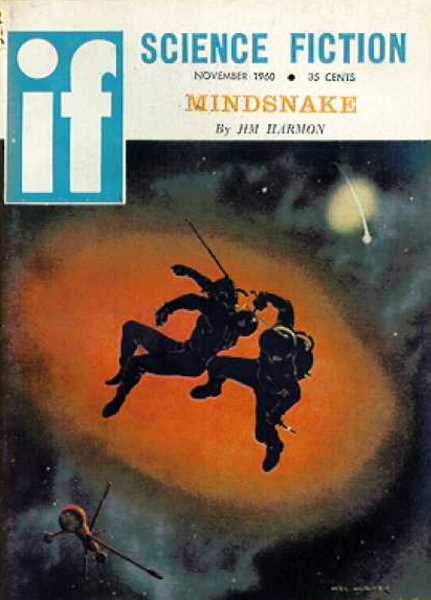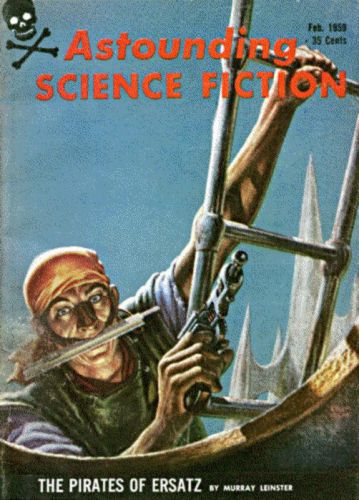
Galaxy's little sister, IF Science Fiction has settled into a predictable format. Filled with a number of "B" authors, mostly neophytes, it generally leads with a decent novelette, and the rest of the stories are two and three-star affairs. I don't think the blame can be put on IF's shadow editor, Fred Pohl (Horace Gold is all but retired these days, I understand). Rather, this is about the best quality one can expect for a penny a word.
That said, the stories in IF are rarely offensively bad, and perhaps some day, one of these novices learning the ropes of writing in the minor leagues will surprise us with a masterpiece.
Preamble out of the way, let's take a look at the November 1960 issue:
Jim Harmon is actually quite the veteran, and he has a knack for interesting, off-beat writing. His novelette, Mindsnake, depicts a future where interstellar teleportation is possible, but fraught with risk. Only the Companions, colloquially known (and disparaged) as Witches, can keep a traveller's mind intact over the long journey. Good stuff, and original. Four stars.
Then we have the short Superjoemulloy by unknown Scott F. Grenville. How can the most powerful man challenge himself? By creating a superior version of himself, of course. Three stars.
Now, I was a bit dismayed to find Daniel Keyes in the Table of Contents. Whenever I see a "big name" in IF (and there is no question that Keyes is a big name: he won the Hugo this year for Flowers for Algernon), the story is usually a second-rater. Sure enough, The Quality of Mercy, which clunkily mixes sentient computers with organ transplants and mandated euthanasia, is a bit of a talky mess. Two stars.
R.A. Lafferty is a fellow who may surprise us some day. He seems to be enjoying an upward trajectory with his stories, not just in quality but in venue. McGonigal's Worm, in which every animal on Earth loses the ability to breed, is sort of a poor man's Brain Wave. Read it, and you'll see what I mean. Three stars.
Esidarap ot Pirt Dnuor is an engaging little tale of tourism in a rather backward place, brought to us by Lloyd Biggle, Jr, who spends much of his time appearing in Fantastic. I liked it, but I'm afraid I didn't get the final joke–an Un-Prize to anyone who can explain it to me. Three stars.
I was gratified to find that, per his book review column, Fred Pohl liked much the same stories in Aldiss' Galaxies like Grains of Sand as I did. On the other hand, he liked Dickson's Dorsai! far more than me. Perhaps the novelization (titled The Genetic General) is better than the serial.
William Stuart is back with another well-written story that doesn't quite hit the mark. Don't think about it is a low-grade F&SF-style tale that takes too long to get to its kicker, and whose kicker lacks kick. Three stars.
That brings us to Frank Herbert's Egg and Ashes, told from the point of view of a charming if horrifying little symbiote (parasite?) I felt like the beginning was better than the ending, but I do like the way Herbert turns a phrase. Three stars.
The issue ends with The Impersonator, the third story ever published by Robert Wicks. In the midling future, the Earth is threatened by an impending Ice Age thanks to humanity's rapacious exploitation of the planet's resources. A host of outrageous plans are developed to fix the problem: from salting ice fields with carbon dust, to altering the axial tilt of the planet, to tapping the heat from the Earth's core. It's not a great story, but I liked Wicks' satirical presentation of "doubling down" in an attempt to thwart catastrophe. Three stars.
As you can see, this isn't the best crop of stories. On the other hand, minor league games draw crowds, too. And the tickets are cheaper….


